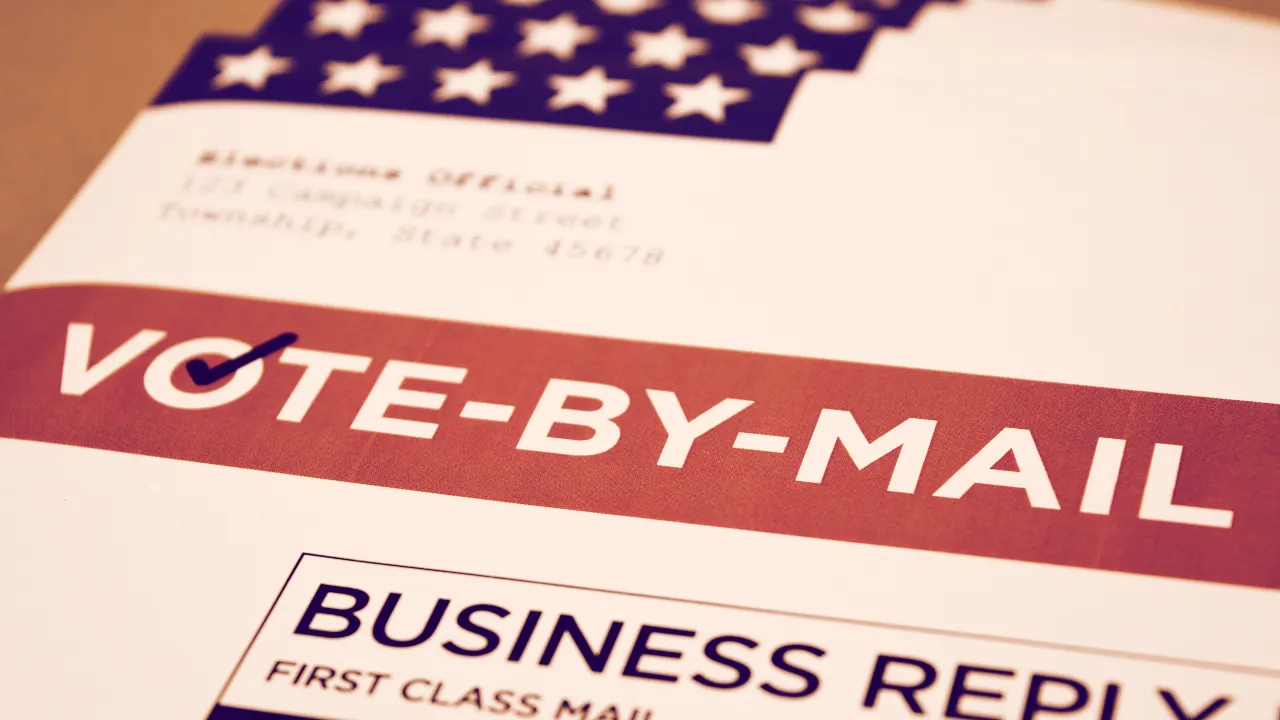In brief
- USPS has proposed using blockchain technology for a mail-in voting system in a patent application.
- President Donald Trump believes that mail-in voter fraud will compromise the election.
- Experts say the postal service's patent is the wrong way to go.
A blockchain-based election scheme, which the United States Postal Service is trying to patent, is unworkable, experts say.
The postal service publicly disclosed its patent application on Thursday, triggering speculation about whether such a plan was in the works. The move seemed intended to add yet another “solution” to the kerfuffle around the November general election.
President Donald Trump believes that mail-in voter fraud will compromise the election. Letters lost or intercepted from the beleaguered Postal Service might not reach the ballot box, he claims, meaning that the election result could be meaningless. His claims have been widely dismissed as baseless.
Experts in election security think the USPS’s application for a patent is specious, and advise against a blockchain voting system altogether. In any case, there’s virtually no chance that the USPS’s system would feature in November’s election, they say. Indeed, USPS spokesman Roy Betts confirmed that the patent application was simply pending and that “nothing happens this year.” He declined further comment.
“The whole thing strikes me as a quick attempt to grab a big swath of patent rights rather than to actually invent anything original,” David Jefferson, a computer scientist At Lawrence Livermore National Laboratory’s Center for Applied Scientific Computing who specializes in election security, told Decrypt.
The patent application, filed in February, comprises a mish-mash of different ideas for a system that would log votes on the blockchain. The basic idea is that a blockchain would distribute votes across a network of global computers, which would theoretically make the voting system difficult to hack.
Jefferson said the patent application “attempts to cover every conceivable voting architecture with a blockchain in it (and any kind of blockchain), with the result that it recommends no specific architecture at all.”
A blockchain voting system could cause far more problems than it solved, said Jeremy Epstein, vice chairman of the Association for Computing Machinery's U.S. Technology Policy Committee. The advent of quantum computing means that votes logged on a supposedly immutable chain could one day be decrypted, compromising voter privacy.
“You want to know that not only today, but for the future is secure. And how are you going to do that with a public blockchain if somebody figures out a way to break the encryption and the future? Then it's all out there,” he said.
One of the largest pilots for a blockchain voting system took place in 2018 when West Virginia let its electorate vote through a blockchain voting app, Voatz. But an MIT paper in February revealed vulnerabilities through which hackers could “alter, stop or expose a user’s vote.”
Epstein told Decrypt that paper voting works just fine; voting fraud is just a “tiny” problem in the US, he said. “The actual number of cases of fraud in the United States is microscopic.”
The government’s consensus is to stick with paper ballots. The National Academies of Sciences, Engineering, and Medicine wrote in a 2018 report that, “at the present time, the Internet (or any network connected to the Internet) should not be used for the return of marked ballots.”
Still, several blockchain voting systems are still in development and operate largely without complaint. Decentralized Autonomous Organizations (DAOs), for instance, rely upon blockchain votes and are thriving amid this summer’s decentralized finance (DeFi) boom.
Developers of bespoke blockchain voting platforms generally acknowledge Epstein’s criticisms yet maintain the merits of blockchain’s immutability. They could serve other purposes, such as small-scale elections or corporate ones—a souped-up Google Poll.
Ray Chow, CEO of Swiss blockchain voting firm domino.vote, told Decrypt that USPS’s design looks “clever considering their business,” but added that any implementation of the technology would be “almost impossible within the Nov. 2020 time frame.”
Reuben Yap, COO of Zcoin, a privacy coin that in 2018 powered the Thai Democrat Party's primary election, said that it would be “dangerous to rush to implement this on such short notice on the upcoming US election.” In any case, “blockchain [isn’t] the panacea here, it’s only a component” of an e-voting system.
Jefferson added: “There is no evidence I can see that the USPS or anyone else is planning an implementation of a new blockchain voting system that we don’t know about.”

